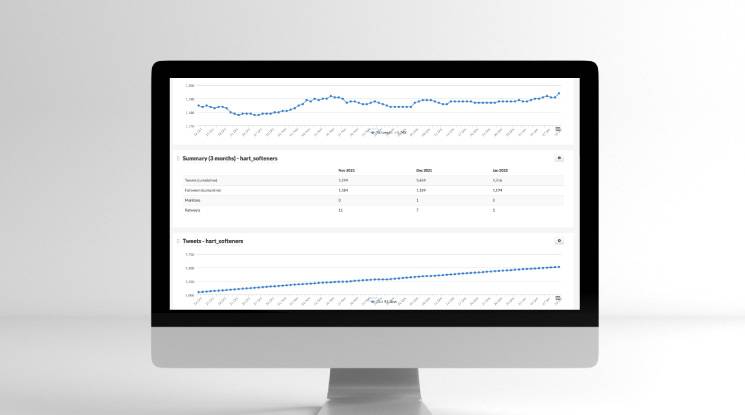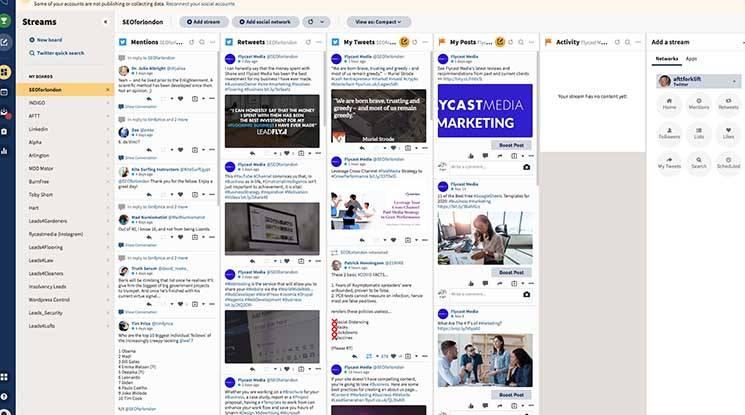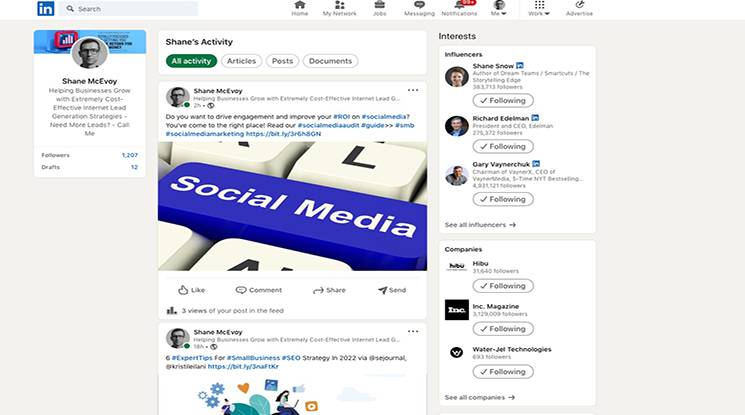A PRACTICAL GUIDE TO CONDUCTING A
FINANCIAL SERVICES SOCIAL MEDIA AUDIT
Drive Engagement And Improve ROI On Social Media
If you're a company in the financial services industry, you understand the importance of having a strong social media presence. However, are you truly maximising the full potential of your social media marketing?
A social media audit is one of the best ways you can improve your financial services social media results. It doesn't need to take long, but it's crucial to get a few things right.
With an estimated 4.89 billion social media users in 2023, and an estimated 5.07 Billion users in 2024 it's worth taking the time to evaluate your financial services social media strategy. An audit may sound daunting, but it's simply a matter of having a checklist and measuring results against specific benchmarks.
Let's explore how you can determine if your financial social media plan is poised for success or headed for disappointment in the coming months.

If you haven’t done this before, you’re about to conduct your first social media audit.
Here’s what you need to do.
Keep A Record Of Your Financial Social Media Audit Results
No social media audit should be a one-off for a financial services business. In order to maximise results for your financial service marketing strategy, you need to set up a regular audit schedule that allows you to analyse results and plan for improvement. This means that you should conduct the audit at regular intervals, whether it's monthly or quarterly. For example, if you take an Instagram audit as an example, without a record of results, how are you going to find out whether or not the effort your team’s recently been putting into reels is taking effect?
One really easy way to record social media audit results is on a spreadsheet. This will allow you to easily organise and view all of the data in one place.
You want your audit to be comprehensive so make space for all of the following (plus any extra notes):
- Dates (decide on monthly or quarterly audits)
- Social media channels (include all of them)
- Profile URLs
- Numbers of followers (plus percentage change since last audit)
- Engagement statistics (plus percentage change since last audit)
- Demographic information (plus any notable changes)
- Referral traffic data (plus any notable changes)
- Last activity dates
- Any network specific metrics (for example from your YouTube audit)
- The media, style, hashtags and posting times of your most popular posts
By conducting a comprehensive and regular social media audit, you can have a clear picture of your business's financial services social media performance, identify areas of improvement, and make data-driven decisions to enhance your financial service marketing strategy.
When you're analysing your data, just bare in mind other factors that could impact your financial services social media performance. For example, you should also consider the impact of external events such as financial market fluctuations, new regulations or economic events. Also, if you have different products or services, you should also evaluate their performance separately and see if there are any notable differences.

Audit All Of Your Social Media Channels
We’ve emphasised the ALL here because it’s easy to think of a social media audit as a Facebook audit or a Twitter audit. However, for now you need to consider your social media presence as a whole. The first thing you need to do is make sure you’re auditing all of your channels.
You might be surprised by how social media accounts you have.
As well as the popular players like Facebook and Instagram, the list could include experimental channels you set up in the early days of your business, or additional ones that have been set up by employees. It’s easy to pick out the better-known channels like Tumblr or LinkedIn, or more contemporary short video specialists like TikTok, just don't forget the others.
Take the time to perform a search for your profile on all the major and minor social media profiles. You may be tempted to remove some accounts straight away. However, this is a social media audit, so for now just record all the relevant information, and keep your decision making for later.
Check For Branding And Detail Inconsistencies
Your social media presence may have developed over time, leaving your channels with different profile images, logos and information. These inconsistencies, or even contradictions in your branding are unhelpful. By checking and optimising all of your social media profiles for consistency and accuracy, you’ll encourage wider reach, and strong audience engagement.
During this phase of your social media audit, you need to.
- Check you’ve occupied all possible banner and image locations with logos, avatars and other images. Make sure these appear with high quality uniformity across all of your platforms.
- Taking into account the character of each platform, make sure your bio and ‘about us’ information is consistent in content and voice but appropriate for the intended audiences
- Ensure your destination URLs lead to appropriate and optimised landing pages

Locate And Analyse Your Most Successful Social Media Posts
Examining the successes and failures of your previous posts is the best way to find out which forms of content are really reaching your target audience. Look at posts that have performed both well and badly when it comes to views, likes, shares, and comments. Then take note of the following:
- Media type (for example video)
- Post language and syntax (for example questions)
- Hashtags
- Your own responses to comments
Tweak Your Audit For Each Social Media Platform
It’s important to recognise that social media platforms are all different. Not just when you’re looking at audience demographics or posting options but also when it comes to analytics. This means that, although you’re conducting an overall social media audit, you’ll be including separate platform-specific audits.
Try to be as consistent as you can with this. Although a Facebook audit and an Instagram audit might offer very similar insights, things may look a bit different when you attempt a Twitter audit. Once again, don’t forget to gather insights on all your current platforms. Even if video really isn’t your thing, you never know what exciting revelations YouTube audit might throw up.

Find Out What Other People Are Doing
This one’s really important but we’ve left it to last for a reason. You’ll look at other brands with new eyes once you understand more about your own social media highs and lows.
Create a list of at least five but no more than ten businesses. These don’t all need to be direct competitors; it can be helpful to look at other influencers who share your niche. For a quick snapshot, you won’t need to gather as many details as you have for your own social media audit, but make sure you ask the questions below:
- How have they optimised their branding across their social media channels?
- How popular are their pages (followers)?
- How popular are their posts (likes)?
- How engaged is their audience?
- How do they utilise post style and media to increase engagement?

What Do You Do If Your Results Are Disappointing?
That’s your social media audit complete but now it’s time to take action with a few analytics of your own. The first thing you need to understand is which social platforms are performing best for your business
If this is your first social media audit, don’t be too quick to dump platforms, or swap them for new ones. There may be other factors at play here. Look carefully for correlations between the type, frequency and timing of posts, and tangible results such as audience growth or increased engagement.
Expert Social Media Management Services
Once you’ve conducted your social media audit, and analysed the results, you’ll need to make some changes. Whether you want to build on successes or work to avoid past mistakes, it’s time to take your social media presence seriously.
You can do this yourself, or it might be time to call in the experts.
At Flycast we assign every client a personal social media specialist. We draw on years of digital knowhow, and pride ourselves on our trail-blazing approach. Contact us today to find out more.
Shane McEvoy is a seasoned SEO and inbound marketing expert with nearly 30 years of experience in advertising. He established Flycast Media, a specialist B2B digital agency, and is a published author of two well-received guides while contributing to several industry publications - read his complete profile here.